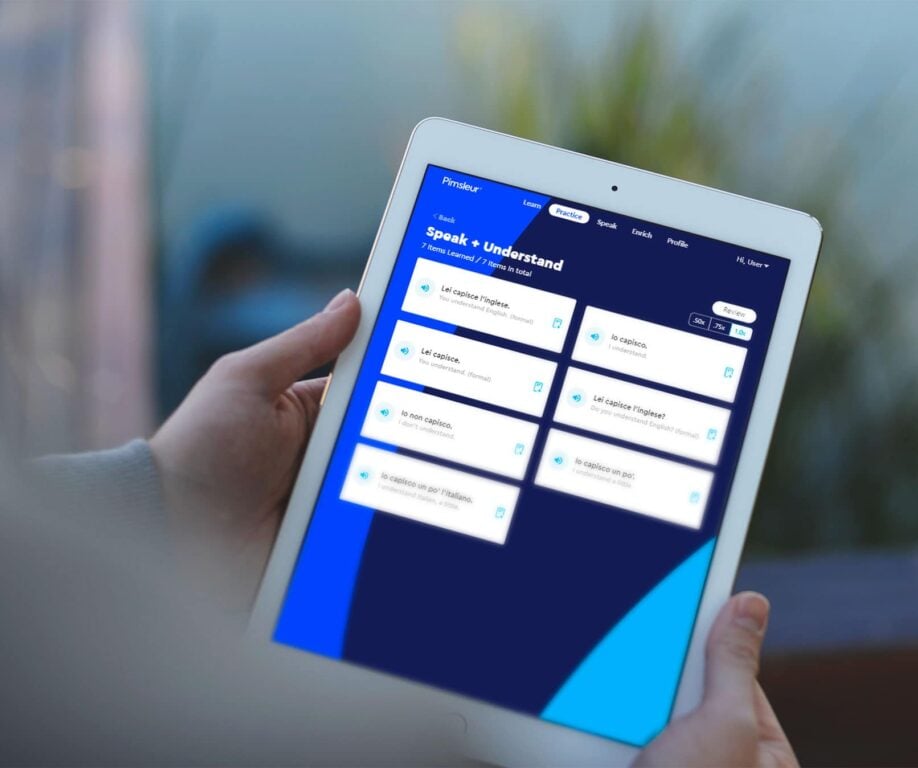What Should I use Language Apps for?
Language apps are an easy and accessible way to approach language learning. They can be effective tools for improving language skills, particularly for beginners and intermediate learners.
In my experience with language apps, I noticed how handy they are to practice grammar and vocabulary. And guess what? Even research suggests they can contribute to improvements in oral communication skills!
Learning grammar is made easy thanks to structured ways to learn and reinforce rules.
The best language apps have dedicated sections of grammar exercises tailored to different grammar concepts, helping learners understand and apply the rules in context.
Learning vocabulary is facilitated by immediate feedback and specific techniques to reinforce word retention. With engaging games and quizzes, vocabulary practice becomes enjoyable and motivating.
Moreover, language apps offer a diverse range of vocabulary topics, making it easy for users to learn words relevant to their interests and goals.
Why Language Apps are Useful for Learning
Their accessibility and flexibility allow learners to incorporate language learning into their daily routines, fitting practice sessions around their schedules.
Language apps provide users with convenient access to language learning materials anytime and anywhere, as long as they have a device and an internet connection.
This makes language apps particularly appealing to individuals with busy lifestyles or those who may not have access to traditional classroom settings.
In fact, a further reason as to why they are widely used is that they are perceived as informal learning tools, which creates a non-threatening environment for practice.
Possible Limitations
Lack of Immersion
However, being good at languages isn’t just about using apps. It’s like cooking a delicious dish – you need different ingredients to make it perfect!
Sure, language apps help with learning words and grammar, but to truly master a language, you need more.
Imagine diving into the culture, chatting with locals, watching movies, and reading books. That’s immersion – soaking up the language like a sponge!
Beyond the App: Real-World Conversations
The best way to practice a language is to use it in real contexts, but if human interaction cannot occur, technology can still help us.
For instance, you want to learn Italian but have no Italian people to talk to? Take advantage of AI to converse like a native Italian speaker.
I found the AI tutor to be very useful to practice because it creates potentially real communicative contexts and adjusts the difficulty of your conversation making sure you can converse at your own pace.

What Science Says about Language Apps
As I mentioned at the beginning of the article, research indicates that language learning apps can effectively support language improvement and learner engagement, particularly for vocabulary learning.
However, most studies look at people who use language apps with their regular language classes, meaning that we don’t get a full picture of how good apps are on their own for learning.
From my personal experience, I would recommend using language apps in combination with language courses and using them to enhance what you learn in classes.
Combining app use and language classes allows you to autonomously put into practice what you structurally learn in class.
Evidence shows that language apps are useful tools for language improvement, and not language learning.
Even if they are beneficial for repetitive grammar work and vocabulary practice, their use should be intended as a supplementary tool alongside traditional classroom instruction.
Should I use Language Apps to Learn a New Language?
The answer is straightforward: if you want to approach a new language, download a good and well-reviewed language app!
There is no evidence that studying a language with an app has a negative impact on its learning path, but there is evidence that the combination of language app use and language courses is the best mix for a perfect result.
That’s why Think in Italian provides a 360-degree learning experience with its language courses as well. So, what are you waiting for?









